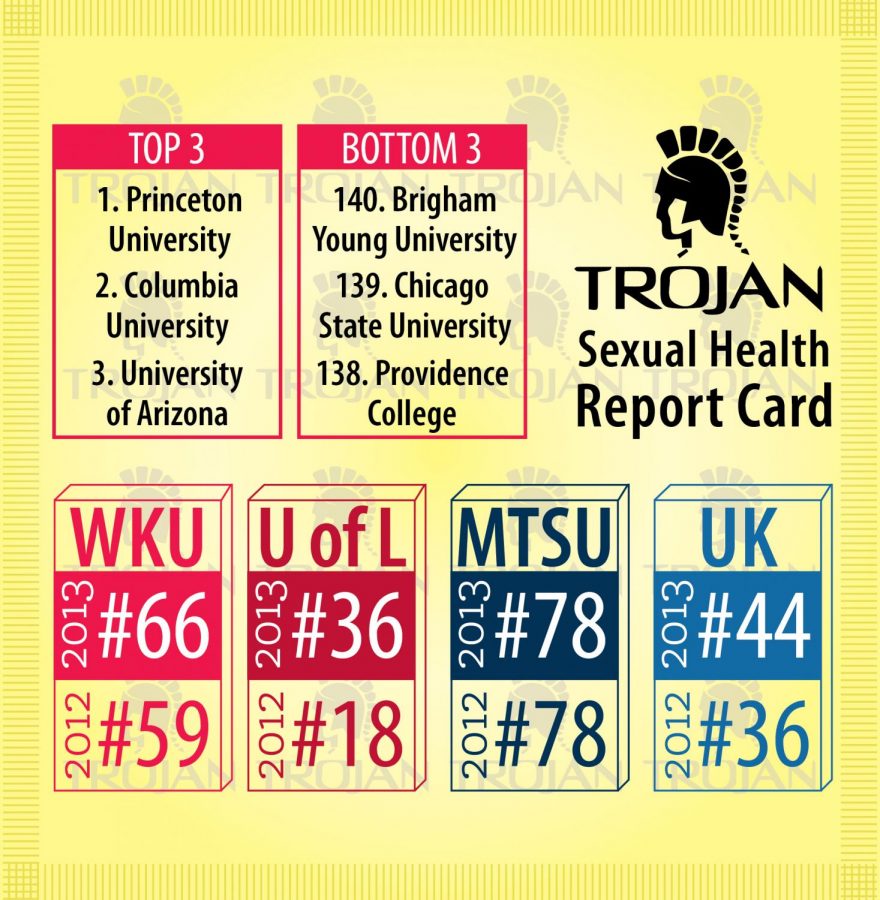WKU can’t keep it up: University goes down on annual sexual health report card
December 3, 2013
WKU is finding it hard to keep up more than just enrollment.
Of the 140 major universities assessed, WKU is currently ranked 66 in the Trojan Sexual Health Report Card, with the top honor for sexual health going to Princeton University. WKU was ranked 45 in 2008 but has experienced a gradual drop over the years.
Since 2004, Trojan Condoms has partnered with Sperling’s Best Places, an independent research firm, to issue the annual report card.
The report card analyzes the sexual health resources and information available to 140 major universities nationwide. Determining factors in a university’s ranking span condom and contraceptive availability, HIV and STI testing and the presence of sexual assault outreach resources or programs.
WKU’s drop in ranking, however, does not necessarily denote a decrease in quality or awareness at WKU.
Bert Sperling, president of Sperling’s Best Places, said falling in ranking may indicate that other universities are simply raising the bar.
“Comparatively, a university can rise or sink,” he said. “Even though they might stay the same or even improve themselves.”
Sperling said while assessing universities can be challenging, ranking methodology also incentivizes quality at student health centers.
“One of the drawbacks of having ranking methodology is you’re always compared against other universities and it turns into a competition,” he said. “That can prove problematic, but it’s good, because you can see how you compare with everyone else. On the other hand, we have seen the general quality of all the schools rise significantly and we would like to think our program has something to do with that.”
Poor or mediocre scores on the report card have also inspired students to request better sexual health information and resources at their schools, Sperling said.
Health Services Educator Lauren Tuttle said WKU’s student health center has not closely observed the Trojan Sexual Health Report Card over the past two years, but nevertheless, continues to maintain and improve sexual health resources and awareness on campus.
“We’ve made great strides,” Tuttle said. “As far as programming and our preventative measures, we offer several services. We have free HIV and STD testing that is competitive with other health care facilities. We provide free condoms and have several programs, including our Passport to Wellness sessions.”
In last year’s survey, the availability of free condoms and WKU’s WellU program received “A’s” on the report card. Sperling said WellU is “very active” as a health program. Less successful areas included Health Services’ web and social media presence, which Tuttle said is still a work in progress.
“We’re still beefing up our social media, but we have been more diligent about promoting our programs which have to do with sexual health,” she said. “We’ve also changed some of our websites to make services more of an option and easier to find.”
A strong web and social media presence is integral in correlation to ranking, Sperling said. University funding tends to be of equal importance.
“In our country, wealth equals health to a large degree, so funding does make things easier,” he said.
Tuttle said the Trojan Report Card can be “a little frustrating” because each university’s approach to sexual health resources differs greatly.
Sperling acknowledged this fact, and that the assessment isn’t all-encompassing.
“I’m not going to say this study is the answer, or it gives all the information,” he said. “We’re evaluating 140 schools and trying to get an evaluation of some very complex things. But it’s a great place to look at some schools and see what they’re doing really well and see what’s possible.”












